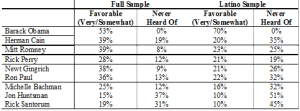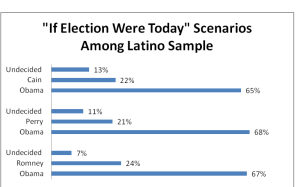Latino Community Tele-Forum: “The Latino Primary 2012”
Conference Call to Focus on Florida as First Major Latino State
MIAMI – The National Institute for Latino Policy will convene a national teleconference of Latino leaders from across the country next Monday, January 23, to host a Community Tele-Forum entitled “The Latino Primary 2012” In the 2008 election, the wave of the massive Latino vote helped propel Barack Obama to victory. With polls showing growing disappointment with President Obama among Latino voters, the upcoming primary in Florida, the first primary state with a major Latino population, raises the question, “Will Latinos vote Republican in 2012?
Held just one week before the Florida primary, The Latino Primary 2012 will allow invited experts and leaders to shed light on what to expect with first major voting contest involving the Latino vote. “Florida represents the first contest of the Latino primary season, a stretch of state primaries involving significant Latino voting populations” said Angelo Falcón, President and Founder of the National Institute for Latino Policy, the event’s sponsor.
The Latino Primary 2012 will help provide a range of analysis and discussion from scholars, political leaders, and community advocates to help navigate and understand what direction the wave of the Latino vote will take in 2012.
To view the full list of contests in the Latino Primary Season, see below.
WHAT
“The Latino Primary 2012”: Latino Community Tele-Forum analyzing the Latino Vote in 2012 Election on the eve of the Florida primary
WHO
Gary Segura, Professor of Political Science, Stanford University; Co Founder and Principal, Latino Decisions. Professor Segura will preview some new data on Latino voters in Florida and across the country.
Maria del Rosario Rodriguez, Co-Founder, Florida Immigrant Coalition
Arturo Carmona, Executive Director, Presente.org
Isabel Garcia, Executive Director, Derechos Humanos, Tucson, Arizona
Angelo Falcón, President and Founder, National Institute for Latino Policy
Other guests to be announced
WHEN
Monday, January 23, 2012
1pm Eastern | 10 am Pacific
WHERE
Conference Call Dial In Number: 800-862-9098
Conference ID: LATINO
Program Title: Latino Primary 2012
2012 Primaries – Latino Primary Season
Jan. 31: Florida primary
Feb. 4: Nevada caucuses
Feb. 7: Colorado caucuses
Feb. 28: Arizona primary
March 3: Washington State caucuses
March 6: Super Tuesday — Georgia primary
March 18: Puerto Rico primary
March 20: Illinois primary
April 3: Texas primary
April 24: Connecticut, New York, Pennsylvania, Rhode Island primaries
May 8: North Carolina primary
May 15: Oregon primary
June 5: California, New Jersey, New Mexico primaries
June 26: Utah primary
Filed under: 2012 Polls/Elections, Election analysis, Obama, Policy Attitudes, Presidential Primary, Uncategorized | Tagged: 2012 Election, enthusiasm, Florida, Latino influence, latino voters, Partisanship, turnout | Comments Off on Conference Call to Focus on Florida as First Major Latino State







You must be logged in to post a comment.